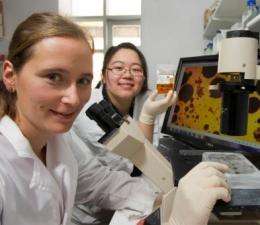Sea sponges could act as early warning system

(Phys.org) -- Sea sponges may hold clues to climate change and other impending environmental risks, researchers from Flinders University believe.
Medical biotechnology masters student Kuo Yang and research assistant Susanne Zeile – under the guidance of Professor Wei Zhang – are researching the potential power of marine sponges as an early warning system for such events as global warming, oil spills and ocean acidification.
Using sea sponges from South Australian waters, where they live in abundance, Ms. Yang will artificially increase water temperatures, add pollutants or alter acidity levels in a laboratory setting to reflect the predictions of scientists and climate change experts.
She will then look for any changes in the cellular structure of sea sponges to see whether those projected forecasts will have an impact.
“In one example, scientists have predicted sea temperatures will rise by about two degrees in the south-eastern region of Australia by 2050 so we’re planning to increase the temperature in a controlled environment as to how it has been predicted,” Ms Yang said.
“And if the sea sponge is stressed we will be able to tell from certain biomarkers on a cellular and tissue level,” she said.
Ms. Yang said the sea sponge had various benefits as an environmental risk “biomarker” as it was more sensitive to water changes and lived both on the shore and in deep waters, “providing a good indication of changes at different levels of the ocean”.
“Sponges are more sensitive than other marine creatures because they’re filter-feeding organisms, they suck in about 20 times their own volume of water every minute to get food so they’re more exposed to the water and as a result more sensitive to the conditions,” she said.
“The other benefit is that they don’t move around like fish – if you put a drop of oil in the ocean a fish would just swim around it but the sponge would filter that water and detect the stress earlier than other organisms.”
Ms. Yang said there were several different “morphological” biomarkers which indicate how a sea sponge reacts to certain variances in water, including a change in colour, shape, size, attachment and the release of a protein which protects it from different stressors.
Yet she said part of her year-long study would be to test which biomarker was the most effective indication of stress in the sea sponge.
Ms Zeile, who is working together with Ms Yang on her masters project, said the research would give scientists, industry and policy makers a better understanding of what could potentially happen to marine environments in the future.
“Because sea sponges are so sensitive they can detect even the slightest variances over a long period of time, variances which we may have not been able to pick up before,” Ms. Zeile said.
“So in that sense they could predict the shape of things to come in the future if climate change, global warming and other human impacts continue to worsen.”
Provided by Flinders University
















